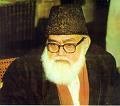
Maudoodi, 1903-1979
Maulana Maudoodi, founder of the Jamaat Islami and a leading Muslim reformer and activist of the Twentieth Century, was interviewed by The Muslim‘s editorial board at the home of the late Rashid Ahmed Siddiqui in Tottenham, North London in December 1968. The interviews were published in the February and March 1969 issues of the magazine. The magazine’s editor-in-chief at the time was Abdullah Jibril Oyekan, with AbdulWahid Hamid the mainstay of its four-man editorial board. The meeting occurred during a period of world unrest: the student demos in Paris, the assassination of Martin Luther King, the overthrow of Col. Arif by the Baathists in Iraq, the emergence of a polical movement to remove the army general Ayub Khan from power in Pakistan – and, in the months to come, the Muslim world was also to witness an army coup in Sudan, bringing Numeiri to power and Col. Gaddafi’s coup in Libya.
With this background, The Muslim‘s editors were much exercised by the question whether an Islamic state could be established by armed revolt. The question was among those put to Maulana Maudoodi, and he took the opportunity to present his strategy of political engagement to bring about societal reform.
| The Muslim, February 1969 – click here The Muslim, March 1969 – click here |
Maulana Maudoodi’s writings and political activism were inspirational for young Muslims in the 1960s. A decade earlier, concerned with the lack of vision of Pakistan’s political elite in the shaping of the nation’s constitution and the centralisation of power in an non-elected Executive, a famous declaration was issued by the Jamaat Islami. It read:
We Demand
That the Constituent Assembly do frame, before the close of the year 1952, the new constitution of Pakistan wherein it must be specifically provided:
- that Islamic Shariat shall form the law of the land
- that there shall be no such legislation as would contravene any dictates of principles of Shariat
- that all such laws as are in conflict with the dictates or principles of Shariat shall be abrogated
- that it shall be incumbent upon the state to eradicate the vices which according to Islam should be eradicated and to uphold and stablize the virtues which according to Islam should be upheld and stabilised
- that none of the civil rights of the people (security of life and property, freedom of speech and writing and freedom of association and movement) shall be forfeited except when a crime is proved in an open court of law after affording the opportunity of defence
- that the people shall have the right to resort to a court of law against transgression on the part of the legislature or the executive machinery of the state
- that the judiciary shall be immune from all interference by the Executive
- · that it shall be the responsibility of the State to see that no citizen shall remain unprovided for in respect of the basic necessities of life, viz: food , clothing, shelter, medical aid and education; and
- that the Qadianis shall be included in the list of non-Muslim minorities and their seats shall be reserved according to their population, through separate electorates
AND we shall not accept any Constitution which fails to incorporate the above points.
On 12th May 1953 Maulana Maudoodi and colleagues were arrested for their part in pressing the Qadiani issue referred to in the last of the demands listed above. Maudoodi was sentenced to death by a Martial Law court. He did not seek clemency but declared “if the time of my death has come, no one can keep me from it; and if it has not come, they cannot send me to the gallows even if they hang themselves upside down in trying to do so”. Under strong public pressure both from within and outside Pakistan, it was commuted to life imprisonment and then cancelled. Maudoodi’s steadfastness and courage was a significant factor in defining the nature of the the first Constitution of Pakistan, promulgated in 1956. This unilaterally ended Pakistan’s status as a dominion and the country was declared the Islamic Republic of Pakistan. It included a provision known as the ‘repugnancy’ clause – that no law repugnant to Islamic injunctions would be enacted and that all existing laws would be considered and amended in light of this provision. A military coup, led by the US-backed army general Ayub Khan, cancelled this constitution and declared martial law.
